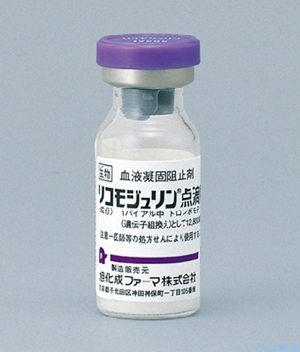100 Stories2008 18 Years of Effort and New Drug Approval for Recomodulin
Yoshikazu Aoki, now president of Asahi Kasei Pharma, has been involved in the research and development of new drugs since joining the company. In graduate school, Aoki was in the Faculty of Agricultural Science, studying biotechnology. At the time, Asahi Kasei's main focus was on petrochemicals, so the company was a latecomer to the pharmaceutical business. Due to this, the company focused on a new field: biopharmaceutical drug discovery.
Aoki was hired as a researcher, and from 1990 he was put in charge of conducting pharmacological tests on animals for Recomodulin, a blood coagulation inhibitor. Once animal studies yielded positive results, the next step was to conduct clinical trials on humans. However, this did not go smoothly. Aoki told the section chief at the time that it was “taking too long” to get the clinical trials underway. Perhaps due to his words, Aoki was soon transferred to the Pharmaceutical Clinical Development Center.
His first task was to find hospitals willing to participate in clinical trials. Aoki also worked hard to find test subjects himself. In recalled that time in his career, he mentioned, “I alone collected one-third of the total number of test subjects. However, the Phase III clinical trial for Recomodulin took more than five years, about twice as long as initially expected.”
In 2003, more than 10 years had passed since Aoki had gotten involved in research on Recomodulin, and he felt a strong sense of urgency.
Aoki looked back on those days of hardship, recounting that, “Because of the delay in development, the priority of Recomodulin within the company was dropping rapidly, and at times our staff was being cut back.”
However, the company finally completed the clinical trials and moved on to the stage of preparing documents for a new drug application. Once the scheduled application date was set, the entire company began moving at once toward sales, and the time for the results of research on Recomodulin to see the light of day was drawing near.
The time period given by the company until the application date was very short and the schedule was tight, so the company made a direct request to postpone the application by one month, although it would affect the work of other divisions.
If the last page of the summary of the review of the company’s application read, “There is no impediment to approving this drug,” it meant that the drug had been approved. Aoki recalls that at the time, “When I received the documents, the first thing I did was check the last page. When I found the sentence that meant the drug was approved, I remember the letters seemed to glow like neon lights on the page,” he said, describing his joy at the moment his 18 years of hard work paid off.
Since Recomodulin had no proven track record overseas, it was necessary to gather data to ensure its safe use even after marketing. Because of the small number of cases that use blood coagulation inhibitors, it was said that it would take 10 years to collect the necessary amount of data, but the company succeeded in collecting the necessary number in two years by visiting hospitals across the country. The hard work put in at this stage was a factor in the company's ability to continue marketing the drug.
The road to approval of Recomodulin was not an easy one, as it took 18 years from initial research until the approval. Throughout that long period of time, the company never gave up, and the passion for development has led to the development of new drugs that have saved many people's lives.
 Recomodulin, a blood coagulation
Recomodulin, a blood coagulation
inhibitor

